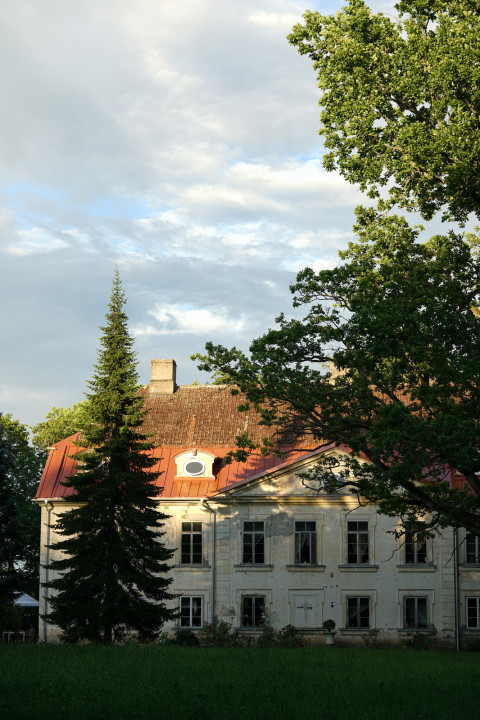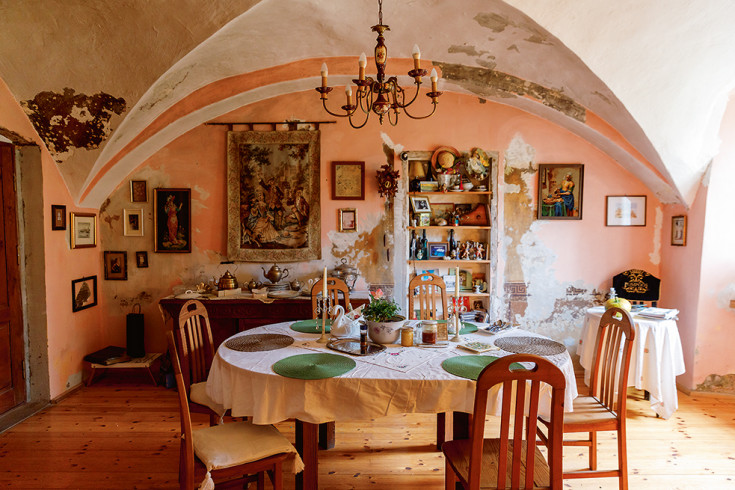Queen of the Castle Dita Balčus / Article
For many Latvians, the country house is the ultimate battery charger, where long summer days are spent tending to the tomatoes and splashing around in the pond. Few do it with more style than Dita Balčus and her daughters, who have turned an old aristocratic heap into a hotel and cultural hotspot.
While every child dreams of what they will be like when they grow up, few of us end up being astronauts or firefighters. But Dita Balčus was doubly lucky, eventually becoming both an actress and a princess.
Dita’s first wish came true via a theatrical career in Riga. And in 2003, when she became mistress of an old dilapidated mansion in Ziemeri near Alūksne, 190 kilometers northeast of Riga, she followed in the footsteps of the Blue Bloods of centuries past.
Dita Balčus from Ziemeri Manor near Alūksne
Photo: Philip Birzulis / Latvian Institute
Notice that the relationship has been more about financial headaches and gritty tinkering than wreaths and horse-drawn carriages. But Dita wouldn’t think of swapping Ziemeri for Buckingham Palace.
“The mansion is both a lot of work and a great pleasure both for us and for the many people who come here,” she says. “And that gives us the strength to continue. “
Over the centuries, Ziemeri Manor has offered hospitality to many colorful figures.
The story begins in the chronicles of 1550, when Johann Felberg sold it for 100 dalders to his brother-in-law Albrecht Seimer. After being devastated by fire during the plague of 1710-1711, it was rebuilt in the classical form that it retains to this day.
As he straddled the highway between Riga and St. Petersburg, Alūksne’s most famous citizens – Ernst Glick, a local pastor who made the first translation of the Bible into Latvian, and his illiterate peasant daughter-in-law Marta Skavronska, whose amazing life culminated in her becoming Czarina Catherine I of Russia – could very well have made a stopover.
And Marta’s husband, Tsar Peter the Great, who frequently traveled along this road, may also have stayed overnight.
In the 19th century, Ziemeri was acquired by the Barons von Wolf, adding to their 90 other estates in Latvia and Estonia. The old feudal order came to an abrupt end in the 20th century. In 1935, the Latvian banker Teodors Plūme bought the place as a gift to his daughter Elvīra, to have it nationalized by the Soviet regime, which installed a library, a dairy, a cinema and many cramped apartments there.
In this mix of history stepped Dita. An avowed city dweller, she felt the quintessential Latvian need to get away from the big smoke and was immediately charmed by Ziemeri. The location, just a few kilometers from the border with Estonia and Russia, gave the place an alluring sense of remoteness. And charmed by the oak trees planted by the first Baron von Wolf to celebrate the birth of his sons, she felt drawn to revive this heritage.
Despite what his generation had learned in Soviet history lessons, the old aristocrats were not “bloodsuckers.”
“Two hundred years ago, people lived here, thought their thoughts and loved each other,” she says. “And I felt that kind of in the air – so much love.”
Realizing that the place needed more attention than just a weekend here and there, Dita and her daughters Elizabete, Egija and Kristiāna moved to Ziemeri for good. The early years were anything but fancy, with a leaky roof, no interior plumbing, and mattresses for the beds. But they gradually removed the Soviet-era dividing walls, restored original details like the stately fireplace, and added their own eclectic interior design to create a space that was both inspiring and comfortable.
Atmosphere in abundance
Evoking the atmosphere is something the family is good at. For 20 years Dita ran a small private theater in Old Riga, while Egija is an actress and Elizabete is a musician. And then there are artists from another realm… More than one guest has encountered ghosts, and a group of visiting clergymen swore they saw the furniture move one night. According to Dita, after parading around the mansion sprinkling holy water, the Dark Hosts were less disruptive.

Ziemeri mansion near Alūksne
Photo: Philip Birzulis / Latvian Institute
All of this makes for an extraordinary hotel experience. You can find them on Airbnb under the name “4 Roses & Wolf”. Said roses are obviously the ladies. Wolf is their gray cat, whose demeanor is nothing short of regal.
The ladies acquired Ziemeri for just 40,000 lats (68,000 euros), the price of an apartment in Riga in the early 2000s. But inevitably, the renovation bill skyrocketed and they still pay off a mortgage on their property. apartment in Riga to finance the dream.
The Covid era has brought more financial worries, as Dita’s theater in Riga, like most cultural institutions, has been closed since spring 2020. But for Dita, money is “just pieces of paper. “and she wants to harness the zeitgeist for new creative endeavors. .
During pandemic closures, middle-class city dwellers are spending more and more time in their rural retreats. And Dita thinks it will be a permanent change.
“With the closing of theaters, concert halls, galleries and clubs, Riga is an exhausted force,” she said. “Now people have time to reflect on life, and they realize that it will never be like it was before Covid. “
Thus, the project is to establish a theatrical and cultural center in Ziemeri to meet this new clientele. Work has started to transform the second floor of the mansion, which was the ballroom and dining room in Barony times, into a performance and exhibition space and a café.
In the meantime, the guesthouse is doing good business. Rules currently allow members of the same household to stay in hotels, and with other travel options blocked, Latvian families are exploring their homeland. And even on the coldest winter days, they are guaranteed a warm welcome in Ziemeri.
“Relationships are the most important thing, and if we click, we enrich each other,” she says. “Through conversations and performances, our customers become our friends. “
This feature was originally published on the Latvian Institute website and is reproduced here with permission.


Comments are closed.